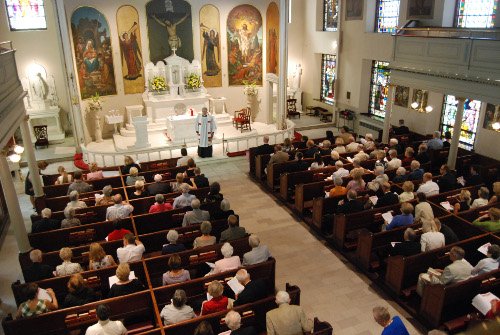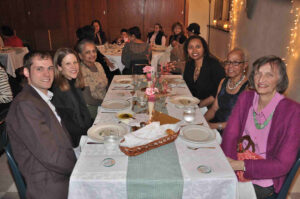Teresa Mee challenges us to think about the task of forsaking the passivity caused by a too-powerful church institution – to build strong, equal, church communities.
I like to think of Church as a living community of persons equal in dignity, following together a way of life inspired by and centred on the way of life of the historic Jesus of Nazareth.
The historic Jesus of Nazareth is probably the last person one would want to have anywhere near an institutional church. His most earnest desire, as he moved around among a mostly underprivileged people celebrating meals and entering into dialogue with them in their homes was to inspire and lead them and his many followers to the joy and liberation of a Kingdom of Heaven in this world and the next. The Kingdom of Heaven the historic Jesus espoused consistently required customary priorities to be reversed. Temple authorities, and institutions underpinning them, had to be swept aside to make way for a newly empowered and free community living according to God’s will and left unfettered by a Priestly hierarchy.
The idea of a living community of members equal in dignity doesn’t sit easy with institutionalism. Still less can the idea of a living community sit easy with half or more of its members being marginalised and without voice. Such a situation brings out starkly that an institutional church ultimately serves the institution and that its dire consequence has been a centuries long passivity within congregations, which will take enormous effort to turn around.
Living Christian community does sit easy with, ‘I am among you as the one who serves’(Lk. 22: 27 ), and we have the ideal of a Christian community with a secure, clearly defined Centre expressed in ‘…may they all be one: as Thou Father art in me and I in Thee, so also may they be one in us’ (Jn 17: 21). The only law is the law of love of God and neighbour. In this model there is no place for marginalising of any group, nor indeed for the wielding of the kind of abusive power that leads to corruption. Living community presupposes mutual respectful listening, mutual understanding and full participation of all its members through on-going dialogue, all leading to personal and community growth and development.
It is becoming increasingly difficult to recognise the features of such a living Christian community in an institutional Church characterised by elitist unlimited power-wielding over a silent, subserviently submissive majority. It brings out starkly that an institutional church ultimately serves the institution and that its dire consequence has been a centuries long passivity within congregations which will take enormous effort to turn around.
The challenge facing us today is how to move on from lamenting the status quo to taking initiative for action. It’s the challenge of crossing over from institutionalism to the ideal of Christian community.
How can we set about it?



Thanks, Teresa, for clarifying this crucial challenge. Institutional clericalism has certainly succeeded in depriving the typical Irish Mass of meaning for most people – and especially for the young.
Even the sacrifice of the people is typically ritualised by a basket of donations for the support of the clerical institution – while alms-giving for the poor has become secondary, something put in a box on the way out.
The first thing we need to do is to notice such things – and the dwindling congregation. The second is to ask one another why we are putting up with this.
Will such issues be raised courageously at the Limerick diocesan synod later this year? The synod’s first theme is to be: Community & Sense of Belonging.
See: http://www.synod2016.com/news/limerick-diocesan-synod-2016-your-church-your-voice/
Mary Vallely’s comment:
“I am so pleased that you speak about the kingdom of heaven being in this world as well as the next, Teresa. We can be so busy thinking of how to save our own souls in order to get to this Kingdom of Heaven that it is to the detriment of protecting and improving life on this planet for all species. Indeed we have a long way to go before we try to make this world a welcoming, nurturing and safe place for our fellow inhabitants.
‘How can we set about it?’ you ask.
“I agree with Sean that the first thing to do is to notice it, to acknowledge it before we set about reaching for solutions. You paint a beautiful picture of an ideal model of church community. Is it achievable on such a vast scale? Are we too set in our ways to challenge the status quo, too comfortable to face the prospect of making ourselves uncomfortable by the questions we each need to ask ourselves?”
A glitch affecting the captcha requirement prevented Mary from inputting this comment herself earlier. I am glad this has been discovered – to be reported to our tech ‘fixers’. Thanks Mary!
To continue Mary’s point about the Kingdom of God, it was, I believe the co-opting of the church by the state early in the 4th century that led to the current tendency to think of that kingdom as an always deferred Heaven-after-death.
For Jesus that kingdom was indeed both present already, and eternal – and he was inviting us into it by promising that he and his father would make their homes in us – if we allow that.
The other ‘observable’ kingdoms of his time had all been created by violence – but in Gethsemane he made it clear that his kingdom cannot, and does not need to, use that option. So it exists always alongside such kingdoms, obeying their just laws and respecting all of their citizens. It can always be sneered at and disregarded, and even attacked through oppression of those who adhere to it, but it can never be completely driven out.
The modern state tends to claim a total allegiance – but the argument it has used over the past few centuries – that it always serves justice – is coming undone. Just now in Ireland, for example, there is a complete schism between the establishment parties originating in 1916 and those who have benefited least from the economy those parties have built. The promise of prosperity and justice for all is losing traction daily – and cannot fail to do so faced with the reality that a winners’ society presupposes that many more must be losers.
Only the values of the Kingdom of God – which can be shared by all truly religious and spiritual people – can transform the typical modern society.
The only ‘kingdom’ that can be already present, yet not subject to ‘observation’ – i.e. via palaces, flags, armies and pomp – is one that reigns within us, as both reality and aspiration. All those who serve the values of the beatitudes already belong.
The kingdom of God was never abdicated by the Lord who dwells within, so it can never be overborne or defeated either, in the minds and hearts of all who give it their deepest allegiance.
Read this article with a lot of interest as it really struck a chord and seems to draw deeply from a very strong theological basis routed in the early Church. Institutionalism does not appear to have served the Church or its congregations well over the last century.
Modern systems that work appear to be characterised more by innovation, flexibility and support for individual inspiration. This sounds so much more like the early Church described in this blog. Hierarchies, dogmas and dereliction of responsibility sounds so much more like a failing system and characteristics that may be recognised in the Churches recent history.
Empowered communities have so much more vitality and energy especially when the freedom to act and think is complimented by clear goals and the spark of something special. The early Church clearly motivated it’s community. Responsibility appears to have been shared and there seems to have been a real shared purpose by members.
Well done on this article – a great read. It sets out a diagnosis of problems and leaves a vision of a future model that works
Teresa likes to think of a “living community inspired by the life of Jesus”. The gospels are not a story of something that happened 2000 years, but a challenge to us to see where we are in the story and what we are doing to bring about the Kingdom.
I heard today of a parish group who put together a Stations of the Cross service for Good Friday with enactments of each Station and a reflection relating each one to what is happening in our world today and the challenges for us. The parish priest told them to change much of the wording and the images, as it was “too political, what people are seeing on the TV news, and not what they come to church for”.So much for being inspired by the life and death of Christ.
Conor is right when he says “empowered communities have so much more vitality and energy”. When will we have the shared responsibility envisaged by Teresa?
Its a real shame that our sacramental and liturgical life stifles rather than encourages creativity as is so clearly illustrated in this example. It is no wonder people drift from involvement in the sacramental life of the church due to its lack of relevance, while others resist any change, experimentation or use of modern media to relate it to what is happening in our world today. Heaven forbid! So it becomes a predictable formulistic recital of a nice story of what Jesus did for us 2000 years ago and if we believe it we will maybe make it to heaven some day. Professional clericalism bears a big responsible for allowing liturgical forms to become ends in themselves and the beginning and end of church life. The shape and limits of the local church seems to be the shape and limits of the clerical job description.
Very interesting article. Raises the question as to who the historical Jesus of Nazareth actually was? Does our church today, and even our theology, truly reflect his beliefs? Maybe it does, but if it does not then we really have a problem. Time to question ourselves!
‘Our theology’Ciaran? My guess is that there is no single shared theology in the Irish church now, great boredom with the rational theology of dogma and even impatience with those aspects of it that impute violence to God (e.g. God had to punish someone for all our sins and required Jesus to make up for what our own sufferings could not).
For me the greatest tragedy is the fear that many attach to even discussing these issues – and a resulting two generations of denial of dialogue, since c. 1968. This great Irish famine of the mind lies at the root of our present deep crisis. Teresa’s emphasis on community is timely: we need to meet, get to know one another and develop a vision of a communal church. Only then will we be respecting the Eucharist as we should.